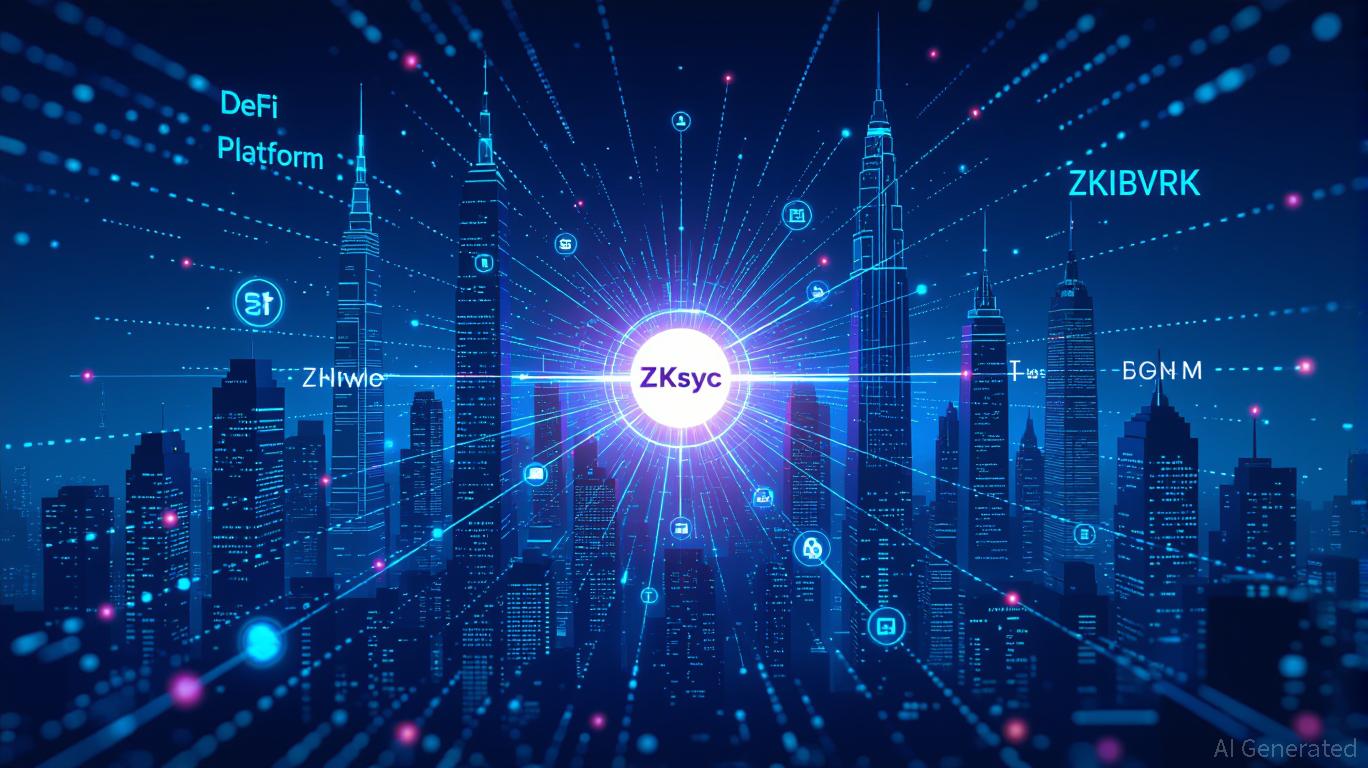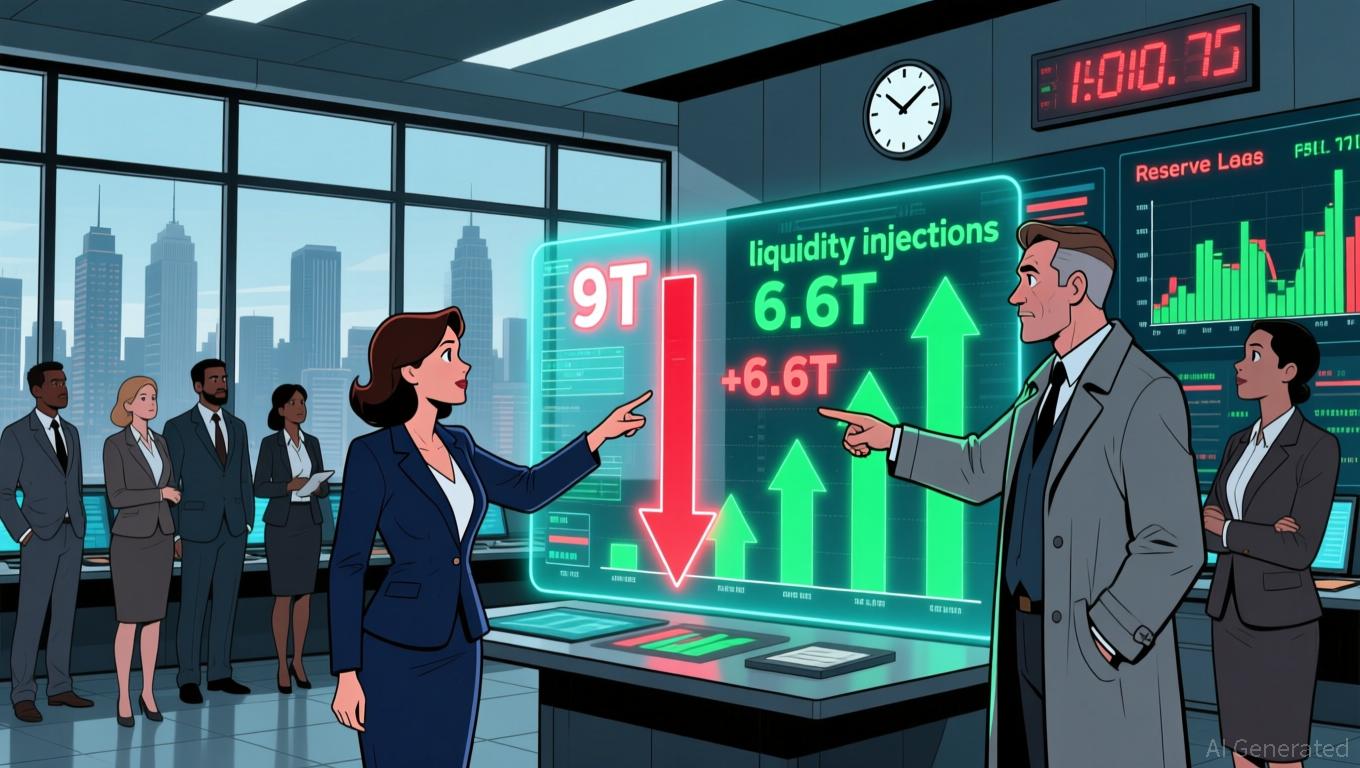ZK Atlas Enhancement: Transforming DeFi with Zero-Knowledge Powered Scalability
- ZKsync's October 2025 Atlas Upgrade introduces modular Layer 2/3 infrastructure, achieving 15,000 TPS and slashing proving costs via RISC-V-based Airbender prover. - The upgrade enables zero-fee DeFi transactions and real-time asset tokenization, with ZK token surging 50% and $19M in institutional funding for integration. - By unlocking RWA tokenization and addressing trust gaps through ZKP protocols, ZK infrastructure is redefining DeFi scalability while navigating regulatory and integration challenges.
The
ZK
Atlas Upgrade: Transforming DeFi Scalability
The ZKsync Atlas Upgrade, revealed on October 8, 2025, marks a major evolution in blockchain design. By deploying a modular Layer 2/3 framework, it supports more than 15,000 transactions per second (TPS)—a dramatic improvement over Ethereum’s 30 TPS ceiling, according to the
For DeFi, this translates to zero transaction fees and immediate settlements, addressing two major barriers to widespread use. Picture a decentralized exchange (DEX) where trades are completed in milliseconds without gas fee battles, or a lending service that updates collateral instantly. The
Institutional Embrace and Market Reaction: ZK Gets the Green Light
The industry has taken notice of this shift. The ZK token, native to the ZKsync network, jumped 50% after the upgrade, reflecting strong institutional interest, according to the
The ZK Atlas Upgrade also paves the way for tokenizing real-world assets (RWA) by enabling

Obstacles and Future Prospects
No major innovation comes without challenges. Regulatory uncertainty and the difficulty of integrating ZK with existing systems are still significant obstacles. Yet, ZKsync’s modular approach and support for Blockchain-as-a-Service (BaaS) solutions help reduce these risks, as explained in the
Additionally, the ZKP (Zero-Knowledge Proof) protocol’s verified knowledge economy—where users bid on and confirm factual information—complements ZK infrastructure by closing trust gaps in decentralized systems, as noted in the
Conclusion: Essential for the Next Wave of Finance
The ZK Atlas Upgrade is more than just a technical enhancement—it’s a roadmap for the future of DeFi. By resolving scalability issues without sacrificing security, ZK technology is quickly establishing itself as the foundation of Web3. For investors, this means preparing for a world where blockchain is not just experimental, but a core part of global finance.
With the rapid ascent of the ZK token and growing institutional alliances, the market is already anticipating a future dominated by ZK-driven platforms. Ignoring this development isn’t just missing a trend—it’s overlooking the next $100 billion opportunity.
Disclaimer: The content of this article solely reflects the author's opinion and does not represent the platform in any capacity. This article is not intended to serve as a reference for making investment decisions.
You may also like
Bitcoin Updates: Bitcoin Rebounds Following Shutdown Deal, Looks Toward Major Regulatory Progress
- Bitcoin stabilized above $105,000 as U.S. lawmakers neared ending the 40-day government shutdown, potentially boosting market liquidity and crypto demand. - Analysts highlight a "dual catalyst" of shutdown resolution and expected lower CPI data, predicting Bitcoin could rise to $112,000 amid improved macroeconomic optimism. - Trump's $2,000 tariff dividend proposal and CFTC's planned approval of leveraged crypto trading next month further support risk appetite and institutional interest. - Regulatory del
Bitcoin Updates: The 2025 Crypto Split—Blue-Chip Reliability Versus BZIL’s Rapid Growth Prospects
- BullZilla ($BZIL) leads 2025 crypto presales with a 3,941.56% ROI projection, priced at $0.00023239 during its 9th stage. - BNB and TRON (TRX) maintain steady gains at $952.79 and $0.286888, offering conservative alternatives to BZIL's speculative growth. - Market optimism, fueled by Trump's economic remarks and Bitcoin's rally, drives attention to BZIL's deflationary tokenomics and 24-stage burn mechanism. - Critics warn of presale volatility, but BZIL's liquidity locks and staking rewards aim to mitiga

DASH Price Drops 7.21% Following Shareholder Sale Disclosures
- DASH fell 7.21% in 24 hours amid a 27.4% 7-day drop, despite a 99.6% annual gain. - A shareholder trust filed to sell 4,575 DASH shares via a 10b5-1 plan, signaling potential ownership shifts. - DoorDash faces intensified grocery delivery competition from Instacart, Walmart , and Venmo's new rewards program. - Technical analysis shows weak mean-reversion potential post-sell-offs, with high outcome dispersion requiring strict risk management.
Fed Faces a Pivotal Choice: Managing Liquidity or Controlling Inflation
- Fed may expand balance sheet to address liquidity needs amid shrinking reserves, signaling potential end to 3-year QT program. - Officials pause QT as $6.6T reserves deemed "somewhat above ample," but warn of risks from inflation above 2% target and market volatility. - Governor Mester cautions against aggressive rate cuts, citing economic rebound risks and fiscal/regulatory factors boosting 2026 growth outlook. - External pressures including government shutdown delays and stablecoin demand growth compli
